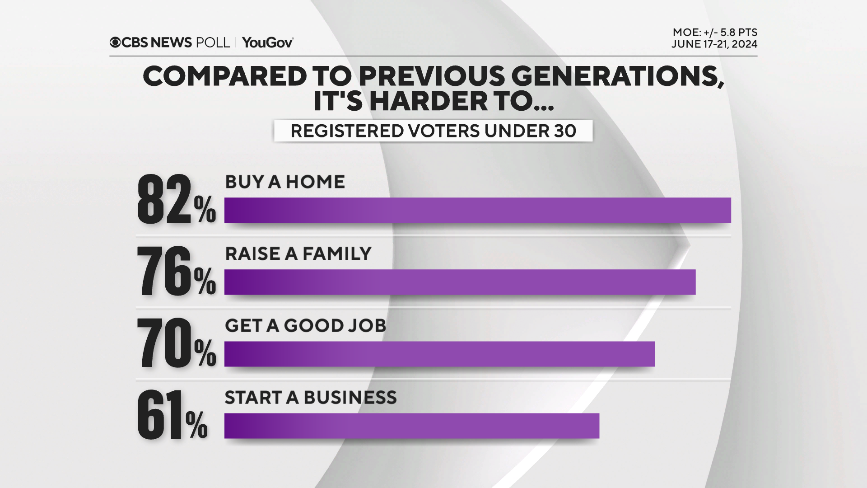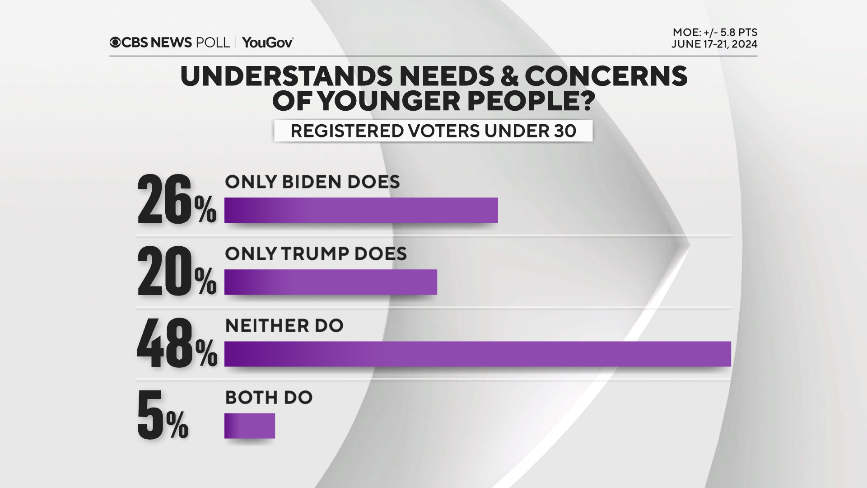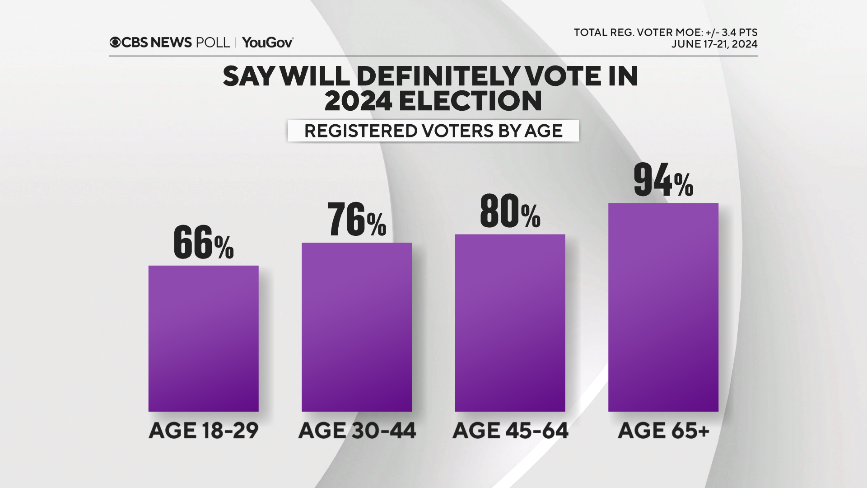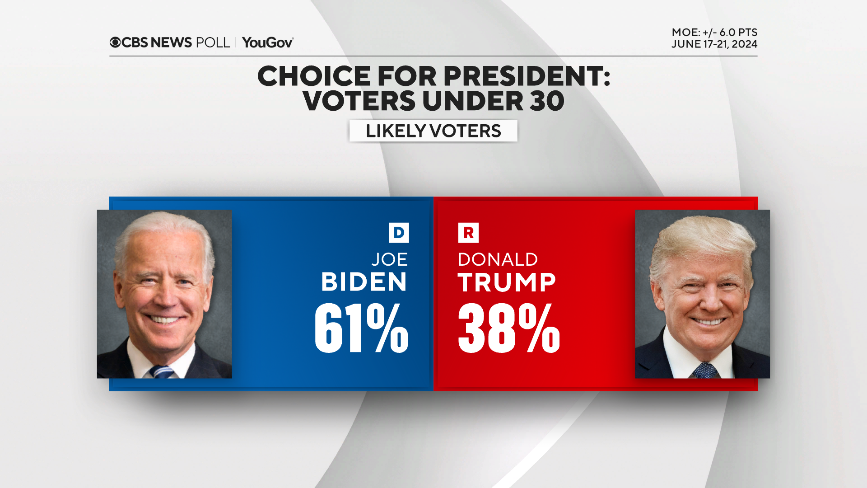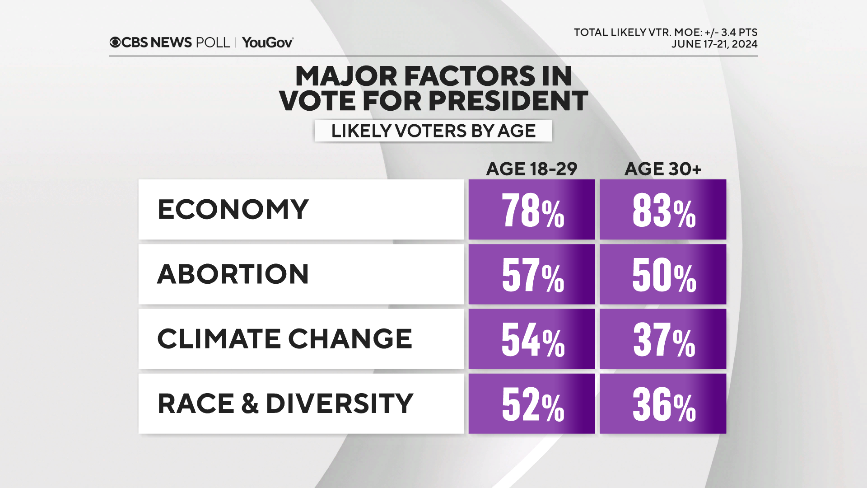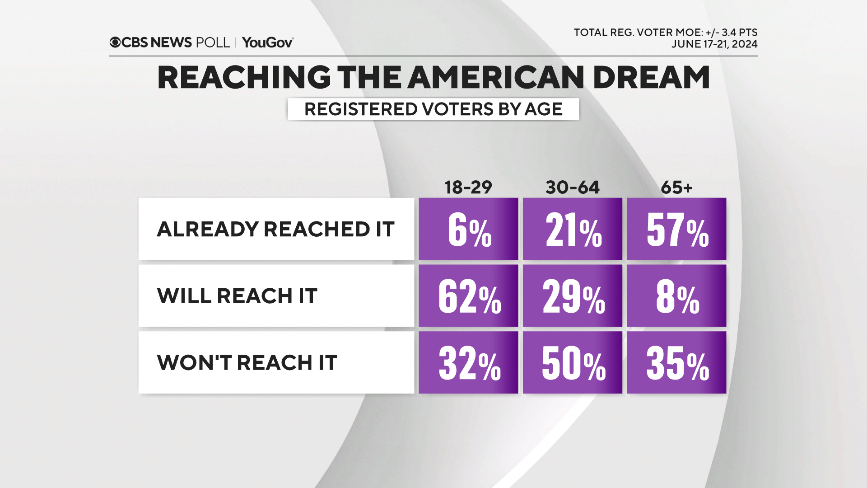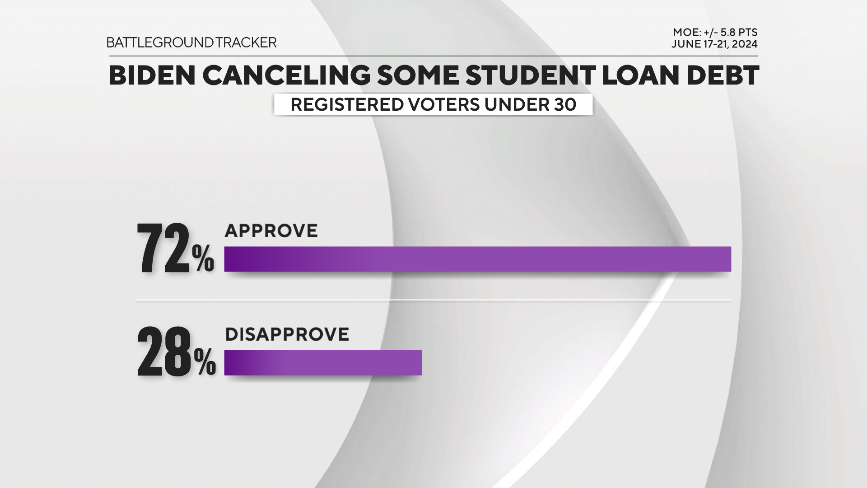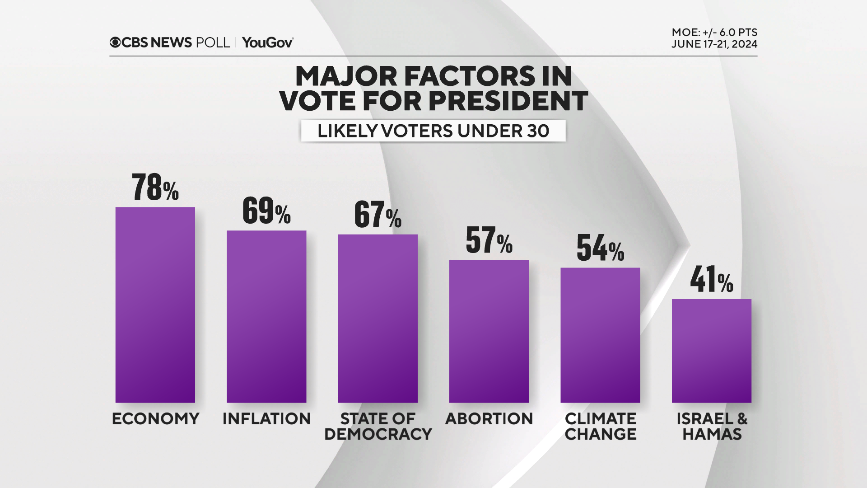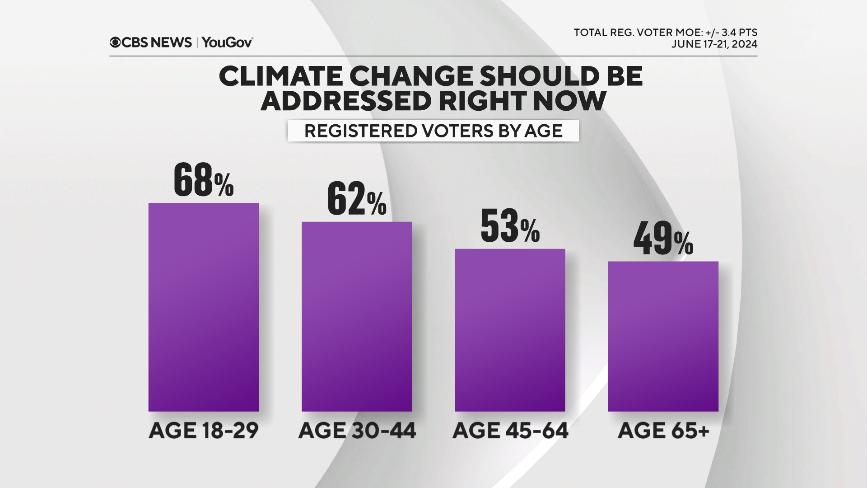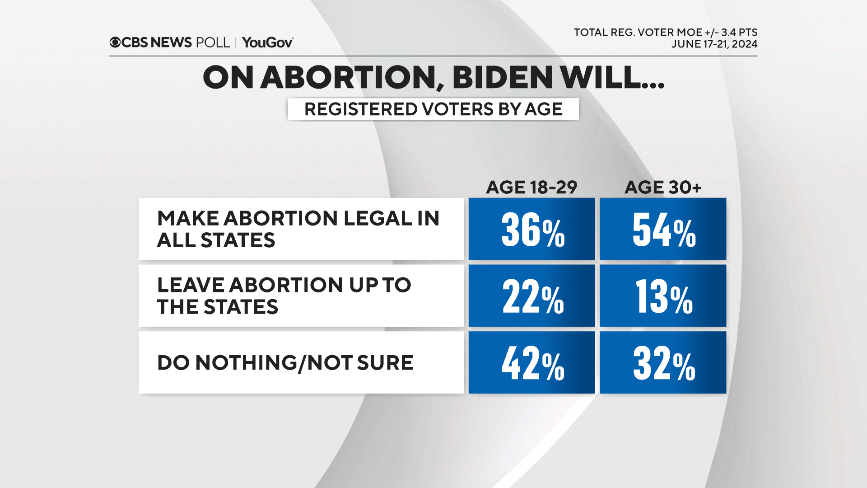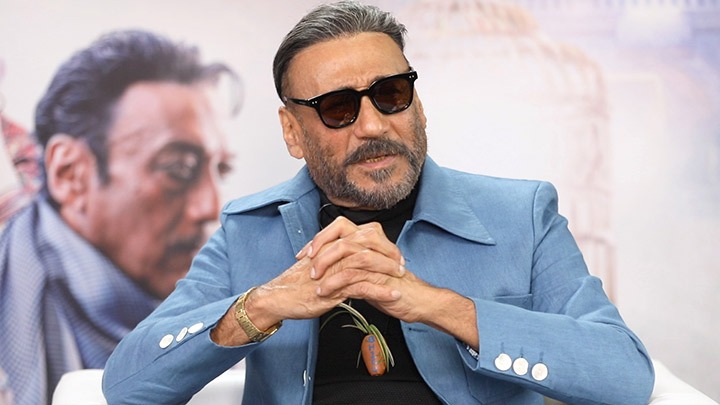It’s actually not all ok, Boomers — at least not in the eyes of America’s youngest voters.
Many under 30 believe their elders are leaving them a more dangerous world, with a worse environment and less opportunity.
These young voters are a more diverse group than older generations and in contrast to America’s oldest voters, they think politics would be better with more of that diversity, too.
They’ve already faced challenges. They were disrupted by COVID: the youngest of them were in high school or college during the lockdowns and now say their education was interrupted by it. And to a far greater degree than older generations, many also look back and describe growing up with concerns of gun violence.
Today, they overwhelmingly feel it’s become harder to buy a house (current interest rates would suggest they’re right), to raise a family, to get what they consider to be a good job (this, despite the strong national jobs numbers) or to start a business than it was for generations before them.
But most do remain hopeful about reaching the American Dream some day, and they’re making their own path en route: Today, they describe their generation as “creative,” followed by words like “innovative” and “diverse” — all qualities most think will help them eventually change the world.
Their focus is on different issues from their elders’ too, with more on climate, abortion and promoting that diversity.
Yet for all those concerns — or maybe because of them — they aren’t planning to vote as much as their elders. They’re thinking less about the election right now, and fewer of them say they’ll definitely vote than their older counterparts.
So the extent to which they do or don’t participate in ’24 could be the most immediate way they’ll shape the future for us all.
On diversity
Majorities of voters under thirty think politics would be better with more diversity: More minorities, more women in office and (perhaps unsurprisingly) more young people.
There are big differences comparing these views to those over 65, far fewer of whom think politics would be better with that diversity — and who grew up in a very different and less diverse America.
How age of the candidates factors in the campaign
Talking about young voters sets up a natural contrast with the age of this year’s candidates — which for some of these young voters marks a fifty-year or greater gap in ages — and how that affects their views.
Half of these younger voters feel the candidates’ respective ages — President Biden and former President Donald Trump’s — make them out of touch.
Half of them say neither presidential candidate understands younger people … and most importantly, when they feel that, they’re relatively less likely to want to vote.
The big question: Turnout
They have critiques and issues, but will they show up? The answer, at least on their stated intent from here, is not as much as their elders.
In fact, among those who did vote in 2020, only three-quarters say they’ll definitely do so again this time.
That’s a higher churn rate than for other age groups.
Historically, younger voters don’t vote as much as older voters do, so that’s not unique to this younger generation now — it’s often about people’s life stage, putting down roots in a community, developing habits of voting, getting involved or just having more time to follow politics as one gets older.
That said, just one in five young people feel their generation has a lot of say in the political process — even while at the same time, many of them aren’t likely to vote.
Just a third are thinking a lot about the presidential race right now.
When asked for the reasons why they won’t vote, responses include that it doesn’t appeal to them, they don’t have time or that the whole system is bad.
Young people are more disappointed with their choices in this race than the oldest age groups are.
But here’s another difference. Older voters will vote regardless of whether they’re satisfied with the candidate choice; they do so out of a sense of long-standing habit, party allegiance or duty.
But for younger voters, a lot of whom aren’t satisfied with the choices they have, candidate satisfaction matters more. When they aren’t satisfied with the candidates, they aren’t as apt to show up.
A wider range of issues that matter
For voters under 30, the economy is a major factor in their vote, as it is for all voters, but they’re more likely to also include other issues in their calculus, such as abortion, climate, and issues of race and diversity — all of which accrue to a Biden vote.
Their percentage support today is not much different from 2020 either, though the turnout factor looms for their impact on Mr. Biden. Right now, young Democrats express comparably less likelihood of turning out than young Republicans.
By comparison, issues that Trump does well on with older voters — crime, immigration — are comparably less important to younger people.
(We should note, they’re voting for Mr. Biden when they say diversity is a top issue, but a substantial portion of them still think he hasn’t gone far enough promoting it, so it’s not that they’re completely satisfied with the president.)
Economy, opportunity and the American dream
Views of today’s economy for them seem connected to ideas of opportunity, not just day-to-day finances.
When young people think they can attain the American Dream (as most of them do, despite all their perceived challenges) they’re relatively more likely to call today’s economy good. When they can’t see getting the Dream, they say the economy today is bad.
(Notable for larger context, too: young people, still full of optimism, mostly think they can reach the American Dream, and most older voters over 65 think they have; it’s actually people in between, in their prime working years today, who are most pessimistic about reaching it.)
Guns
Most say they grew up concerned about the possibility of gun violence when they were in school, a level of concern far higher than older voters express looking back.
That seems to impact their stances on gun policy. A majority support stricter laws covering the sale of guns, and that support is even higher among those who grew up concerned about gun violence.
Student loans
And they’re big fans of canceling student loan debt. (Biden gets big backing from those who do.)
But is it a motivator on its own? That’s less clear. Those who approve of it are no more likely to say they’ll turn out than people in the age group, overall.
War
Despite the attention over recent months and protests on college campuses, for the wider under-30 group, the war between Israel and Hamas ranks well below the economy, abortion, and many other issue factors.
However, they do feel very differently about it than older Americans, with relatively more of them calling for a stop to Israel’s military action.
Climate
They’re more likely to say climate change needs action now.
Abortion
If the Biden camp wants to motivate turnout along abortion lines, they may have some work to do:
Most younger voters want abortion to be legal — as do most voters overall — but they’re less likely than older Americans to think Biden would try to pass a national law legalizing it, and more likely than their elders to be unsure what he’d do.
They’re also more apt to think Trump would do nothing, or to be unsure what Trump would do.
This CBS News/YouGov survey was conducted with a nationally representative sample of 2,460 U.S. adults interviewed between June 17-21, 2024. The survey included an oversample of adults age 18-29 for a total of 743 adults in that age group. The final sample as reported was weighted to be representative of adults nationwide according to gender, age, race, and education based on the U.S. Census American Community Survey and Current Population Survey, as well as to 2020 presidential vote. The margin of error for the total sample is ±2.8 points. The margin of error for the sample of adults 18-29 is ±5.2 points.


